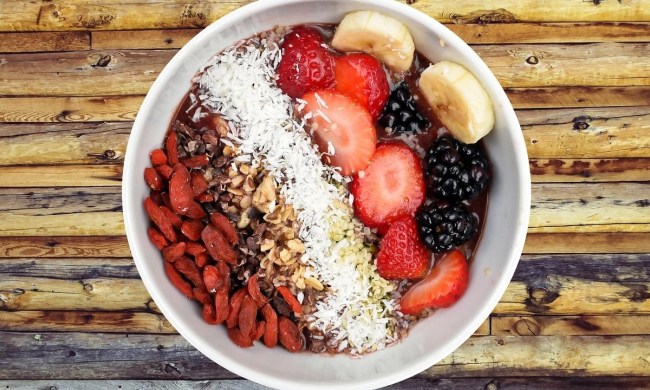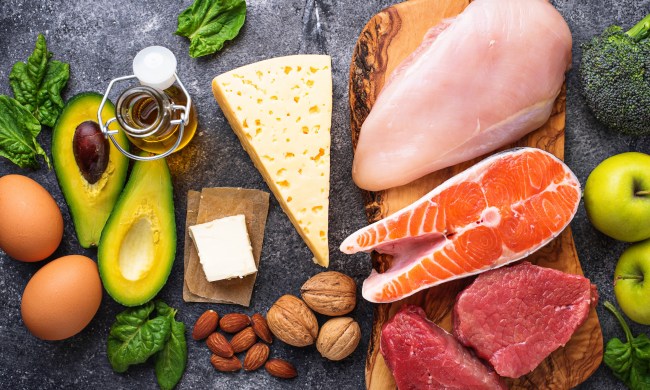While fasting has been practiced for hundreds of years, it has recently been used as a weight loss method. Intermittent fasting, specifically, has taken off, as it is considered more realistic since it allows you to still eat, just within certain time frames. While there are a few different intermittent fasting methods you can try, many people are fans of the OMAD (one meal a day) diet.
Keep reading to learn how to follow the OMAD diet, its potential benefits and downsides, and answers to frequently asked questions.
What is the OMAD diet?

The OMAD diet is as straightforward as it sounds: individuals who choose to follow it fast for 23 hours a day and consume all their daily calories within a one-hour eating window. While it may seem appealing as a quick fix for weight loss, the extreme nature of this regimen raises concerns about its long-term effects on health.
Before starting any diet, including OMAD, it’s essential to consult with a healthcare professional or registered dietitian about whether it’s appropriate for your specific health goals and individual circumstances. They can provide personalized guidance and help you make informed decisions about your dietary choices.
Can you eat anything on the OMAD diet?

Technically, yes. When it comes to the types of food, there are no restrictions. While this could be great for some, it may make this dieting method not right for others. Some people may find that they are very hungry by the time they can have their one meal of the day, and this could lead to grabbing unhealthy snacks and fast food because it is quick and easy. However, since you are restricted to one meal a day, it is very important that you get all the nutrients you need for the day in, and this means whole foods are the best option.
Variety is key. Get in your whole grains from brown rice or sourdough toast, include protein sources like chicken, turkey, and salmon, and enjoy healthy fat sources, including olive oil, nuts, and avocados. You want to aim for at least three to four different fruits and vegetables in your one meal as well.
Health benefits of the OMAD diet

The OMAD diet presents several potential health benefits, which have contributed to its rising popularity.
Effective weight loss
OMAD can lead to a calorie deficit, resulting in weight loss. Restricting eating to just one meal naturally limits the consumption of food and snacks throughout the day. This intentionality behind when and what you eat makes it an attractive option for those aiming to shed pounds.
Easy-to-follow routine
One of the OMAD diet’s advantages is its simplicity. With only one meal to plan and prepare, many individuals find it easier to maintain a dietary routine, saving time and effort in meal planning.
Heart healthy benefits
Some studies suggest that intermittent fasting, including the OMAD approach, can reduce the risk of heart disease. It may contribute to improved heart health by promoting weight loss and potentially impacting cholesterol levels. Currently, there is limited research on this matter, and it is recommended to consult a doctor if you have heart problems or are at an increased risk for cardiovascular disease.
Health concerns with the OMAD diet

While the OMAD diet offers potential benefits, it is essential to acknowledge the existing health concerns:
Research is limited
One of the most significant drawbacks of the OMAD diet is the scarcity of research, particularly concerning its long-term effects. The extreme nature of OMAD makes it challenging to conduct comprehensive studies on its safety and efficacy.
Restrictive diet
OMAD is an extreme version of intermittent fasting. Sustaining the OMAD diet over an extended period can be difficult, and its strict eating window may not be suitable for everyone’s lifestyle. Those with a history of eating disorders or other health-related problems like diabetes should consult a medical professional before starting the OMAD diet.
The OMAD diet has captured the attention of those seeking a quick and drastic path to weight loss. While it offers potential benefits, it comes with notable risks and uncertainties due to its extreme nature and limited research. Before jumping into the OMAD diet, consider consulting with a healthcare professional or registered dietitian to determine if it aligns with your health goals and lifestyle. It’s crucial to prioritize your long-term health and well-being when making dietary choices, ensuring that they are sustainable and evidence-based.




